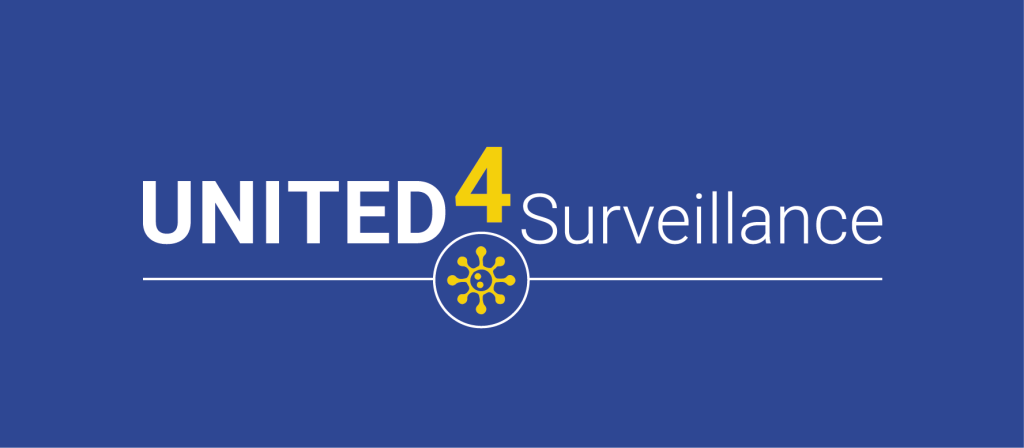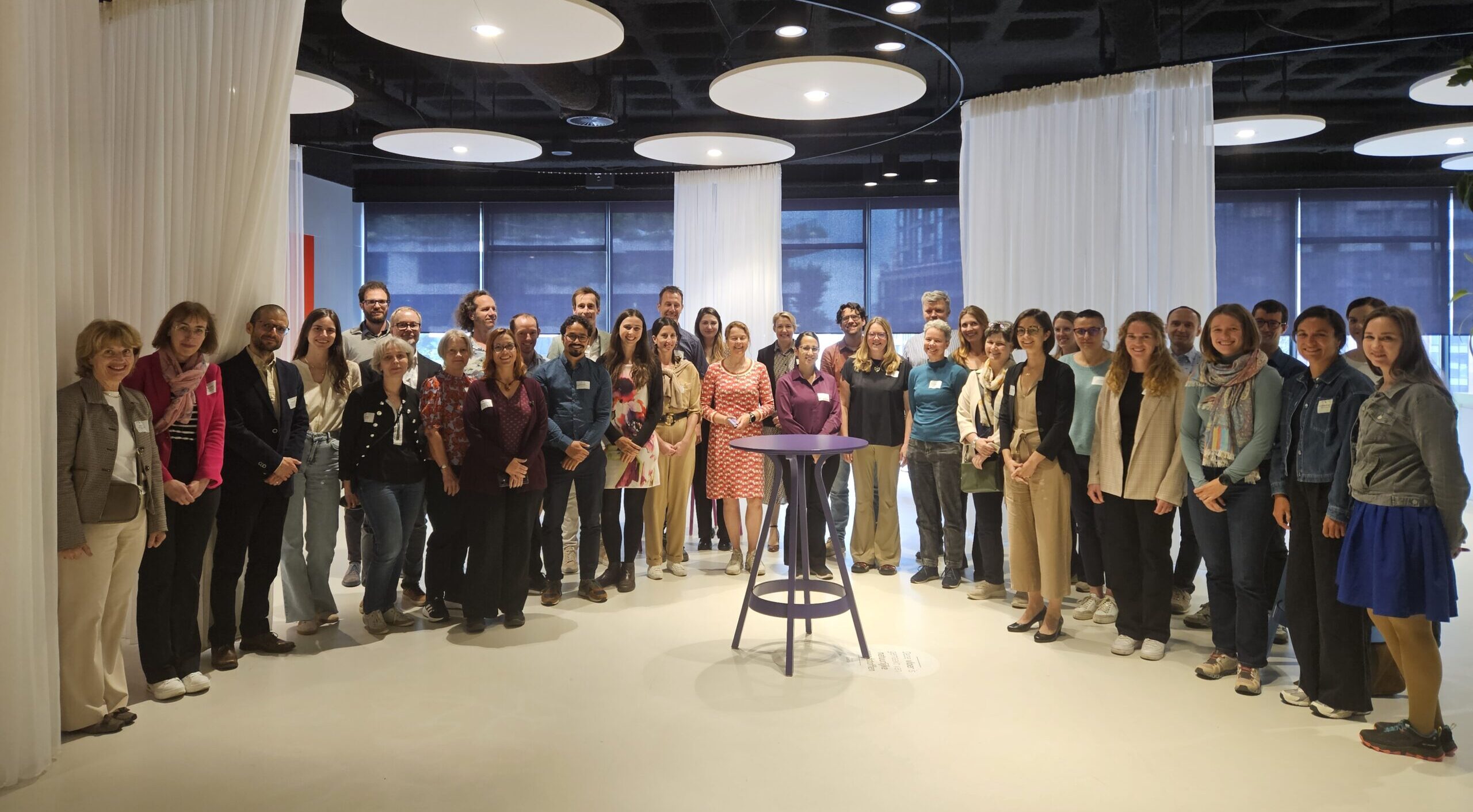The Dutch National Institute for Public Health and the Environment (RIVM), coordinator of the project, hosted the final in-person UNITED4Surveillance General Assembly meeting of the project on 10 & 11 June 2025 in Utrecht, the Netherlands. Around 75 experts and policymakers representing 23 European countries attended in-person or online.
Day 1
The opening was done by coordinator of the Joint Action Eelco Franz with a quick recap of the goal of the project: to strengthen infectious disease surveillance by providing capacity-building at the member-state level and sharing best practices of methods and approaches. Carlos Carvalho provided insight on the potential impact of European Health Data Space (EHDS) on the surveillance of communicable diseases for primary use and secondary use of data and related Joint Actions. Yoline Kuipers from DG SANTE further elaborated on legal acts for epidemiological surveillance: Art 13, Art 14 and Art 15 of the Regulation (EU) 2022/2371 on serious cross-border threats to health, and the about the surveillance network, EpiPulse and the EU reference labs for surveillance.
After that a lively panel session was moderated by Sierk Marbus, during which panelists Yoline Kuipers (DG Sante), Carlos Carvalho (ECDC) and Eelco Franz (coordinator U4S) were invited to share opinions and experiences based on statements, such as “Europe is stronger and better prepared than ever to face the next pandemic”. Interesting was the question to all attending participants to score on “What do you think the current priority is for pandemic preparedness in your country in the context of today’s other global challenges?”. With a wide range (from 0-10) and an average of 5,8 it can be concluded that the focus pandemic preparedness is changing within the broader context of other global challenges.
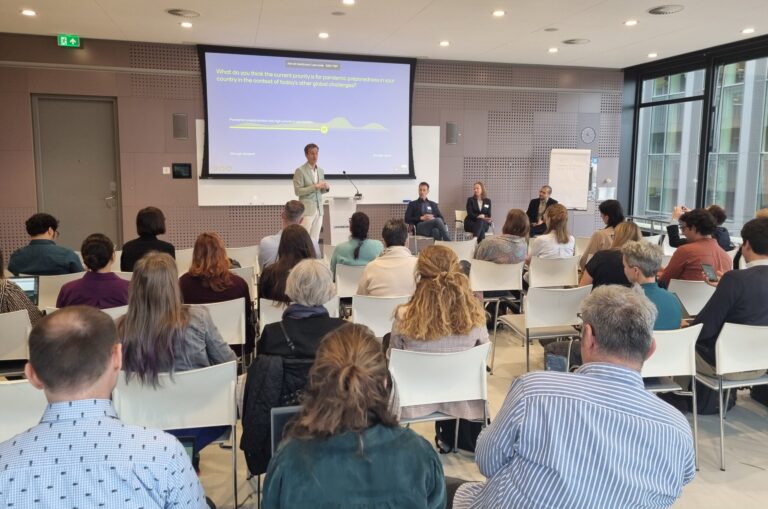
Then the project progress was shared with presentations from all the Work Packages (WP), starting with WP1 Coordination by Eelco Franz (RIVM, NL), WP6 Dissemination by Brigita Kairiene (NVSC, LT), WP5 Evaluation by Anamaria Jurčević (CIPH, CR) and WP7 Sustainability & Roadmap by Brigita Kairiene (NVSC, LT). After lunch the focus was on the core WP’s.
Teemu Möttönen (THL, FI) shared the progress of all the pilot studies within WP3 Hospital Surveillance. Solveig Jore (FHI, NO) and Roan Pijnacker (RIVM, NL) highlighted interesting results from all the pilots within the 3 diseases groups: zoonotic influenza, vectorborne diseases and foodborne diseases. Paulina vom Felde and Ann Christin Vietor from WP2, task 2 Outbreak and Signal detection provided an overview of the tool development and gave an interesting live demo of the signal detection tool. Then, WP2, task 1 Laboratory-based reporting presented their work package and focused on the pilot progress and results and highlighted encountered challenges and potential improvements for legal challenges.
In the afternoon, time was allocated to volunteering project partners to present further details of their national pilot projects. We greatly appreciated the contributions from Anna-Margarita Schötta (AGES, AT) who presented their pilot within T4.3 on the exploration of arthropod vectors in regions with human tularemia, Emma van der Spek (RIVM, NL) who presented about communication for SARI surveillance, Elena Sassu (AGES, AT) who talked about the coordinated effort for the surveillance of zoonotic influenza in Austria and Roan Pijnacker (RIVM, NL) who shared experiences in improving One Health data sharing within the Netherlands. The day ended with the opportunity for networking and catching up with participants over drinks and dinner.
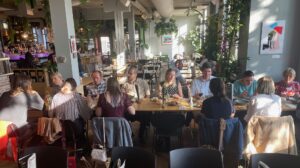
Day 2
On Day 2, the work packages outbreak detection (WP2), hospital surveillance (WP3), and One Health surveillance (WP4) held interactive workshops to further share insights and best practices or to work on different outputs for the work packages, such as deliverables and the roadmap.
WP2 Outbreak detection – Task 1 Laboratory based surveillance
WP2/Task 1 dedicated time to present their pilots in more detail and discuss with the participants. During the breakout session for WP2/Task 1, the four piloting countries – Denmark, Finland, the Netherlands, and Norway – shared detailed updates on their pilot projects with the broader task group. This group also includes several “listening countries” that are interested in Task 1 and contributed to earlier joint subtasks within the task. Each presenter provided an overview of their pilot, outlining its background and objectives, the work undertaken and current status, the impact achieved, details on the delivered product, evaluation outcomes, and lessons learned. They also highlighted plans for future work.
The session, held in a hybrid format, allowed listening countries to participate in discussions and ask questions to gain deeper insight into the different aspects of the pilots.
WP2 Outbreak detection – Task 2 Outbreak & Signal detection
WP2/Task 2 performed a live demo of the automated outbreak detection tool during the workshop. developed Signal Detection Tool is now publicly available. The shiny app for automated detection of signal in infectious disease surveillance data was developed within WP2 with data scientist from four European national public health institutes and was piloted in ten countries. You can explore its features and access the source code on our GitHub repository. If you have questions or you would like to have more information, you are welcome to contact Ann Christin Vietor (VietorA@rki.de).
WP3 Hospital surveillance
In the WP3 workshop during second day of the UNITED4Surveillance General Assembly, seven piloting countries discussed the common recommendations that could be distilled from each pilots experiences. Each piloteer presented the Lessons learnt, Recommendations and Core messages from their respective pilot projects. Together we found several commonalities that will be used for the WP3 final deliverable report “Recommendations for digitalised surveillance systems of severe infectious diseases leading to hospitalisation” — such as the need for a permanent legal framework, using stakeholder analysis to understand roles and expectations, and mapping of surveillance data needs, data sources, IT systems etc.
WP4 One Health
WP4 spent time on the outline and content of the roadmap. In WP4 we concentrated on the Roadmap and the Deliverable 4.2. We used the opportunity to discuss the outline of the roadmap with the participants in our different Tasks Foodborne, Vectorborne and Zoonotic Influenza. We had a broad and good discussion about how to frame the Roadmap and what it should contain. All the inputs from the discussion is gathered and will be worked on further by the project leads.
The latter part of the workshop we concentrated on the Deliverable 4.2 and how we could frame this to our specific work package. We also had a fruitful and good discussion here and this was used to develop the template for this Deliverable 4.2. This Deliverable is now distributed to all participants in our WP4.
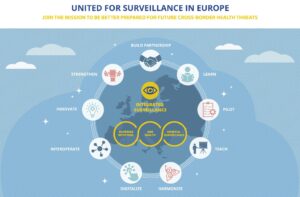
We would like to thank all participants for joining the U4S General Assembly on
10-11 June. We were pleased to welcome you in Utrecht again!
Thanks to all partners for contributing and collaborating within this project. We look forward to continue our collaboration in the remaining months of this Joint Action on the mission to be better prepared for future cross-border health threats!
